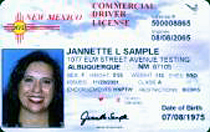2007年VOA标准英语-Privacy Concerns, Cost, Jeopardize Plans For US(在线收听)
Washington
08 May 2007
A key U.S. lawmaker has introduced legislation repealing a law requiring all 50 states to issue standardized, tamper-resistant drivers' licenses. The Homeland Security Department says the law will improve national security, but critics say implementing it could undermine privacy rights and bankrupt state coffers. VOA's Deborah Tate reports from Capitol Hill.
 |
| Sample of current U.S. drivers' licenses, which under federal law must be updated by 2008 to contain a computer microchip loaded with owner's personal information |
It standardized the way states issue drivers' licenses, and established a more robust verification process for applicants and tamper-resistant security features, thus making it more difficult for terrorists to fraudulently obtain such identification documents.
But the Congress did not fund the measure. Eight states have enacted statutes or resolutions opposing implementation of the law because they cannot afford to comply with it.
In addition, civil rights groups oppose the measure on grounds it undermines privacy rights.
The Senate Judiciary Committee explored the concerns about the law at a hearing Tuesday. "Increasingly, Vermonters are worried that too much data is being collected about too many things. It is not just a sense that privacy is eroding, Vermonters are worried that their identities will be stolen by identity thieves," said Allen Gilbert is executive director of the American Civil Liberties Union of Vermont.
Jim Harper, director of information policy at the CATO Institute, estimates the cost of implementing the REAL ID program at $23 billion, and says there is little evidence it would boost security. "REAL ID is a loser: it costs more to implement than it would add to our nation's security protections," he said.
Because of such concerns, the chairman of the committee, Democratic Senator Patrick Leahy of Vermont, has introduced a bill that would repeal the law, and replace it with a previous system under which federal and state officials would make improvements in how drivers' licenses are issued. "Let's see real solutions, a demonstrable results, before we throw away billions of dollars or more accurately, push those costs on to the states in the name of some vague claims of enhanced security," he said.
But the bipartisan commission that investigated the September 11, 2001 terrorist attacks on the United States has endorsed the law.
In an article in the Washington Post Tuesday, commission member and former Navy Secretary John Lehman writes that identity security was one of the panel's most important recommendations because the 19 hijackers had 30 state-issued identification documents, at least seven of which were obtained by fraud. He notes that the hijackers used the documents to assimilate into the United States and board planes on that September 11 morning.
Lehman warns that the hijackers could have done the same today, noting that the issuance of multiple identity documents from one or more states is possible because identities are not verified, and that states do not share such information with each other.
It is a point echoed at the hearing by Janice Kephart, who was a staff member of the 9/11 Commission and is now a consultant on border security. "Not implementing REAL ID simply keeps us right where we are, which is vulnerable," she said.
Kephart played down privacy concerns about the new standardized drivers' licenses, as did James Carafano, a research fellow at the Heritage Foundation. "It is not a national identity card. It does not create new data bases. It does not give the federal government more information about our citizens than it has now."
Supporters of the REAL ID program said Congress was wrong not to fund the measure in 2005, and they called on lawmakers to do so now.